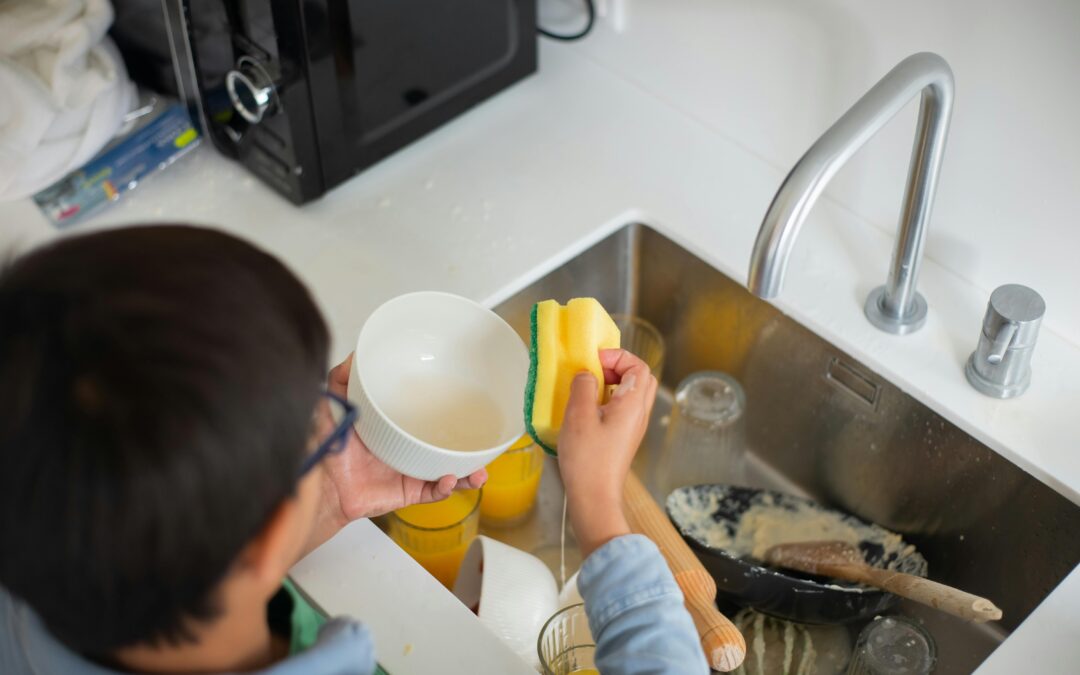In the Montessori curriculum, the Practical Life activities are some of the first lessons presented to our students. This curriculum includes activities designed to help a child to learn how to do everyday tasks such as: pouring water, stringing beads, using tongs, tweezers or chopsticks, folding socks and tying shoelaces. (Just to name a few. The Practical Life area of the classroom is always changing.) The children enjoy using real glass, wood, metal and porcelain dishes and trays- just like they see grown-ups using!
The purpose of the Practical Life materials is to allow the child the time to learn the skill sets that each activity is designed to address, but also to help the child develop the hand strength and control needed for handwriting. Children will demonstrate both of these skill sets in the classroom when they serve snack to themselves and others, when they clean tables after lunch, sweep up after a spill, and of course when they begin to work on their handwriting by recording their work.
To give children some continuity of experience, I often suggest that parents incorporate some Practical Life opportunities in the home. (My son’s favorite activity at 2 years old was dish washing!)
I also recommend giving children the chance to help out around the house by doing some age-appropriate chores. Children genuinely enjoy contributing to the family, and teaching them these skills early helps to foster independence and responsibility. It may take a lot of practice, but eventually your child can be a partner in keeping your home clean and helping out the other members of the family.
Here are some examples of age appropriate chores for children:
Toddler:
Put dirty laundry in hamper
Bring diapers/wipes
Wipe table with cloth
Assist with hand washing
Assist with putting away toys/books
Age 2-3:
Put dirty laundry in hamper
Tidy up toys/books
Fold face cloths/tea towels
Set table
Throw away trash
Bring diapers/wipes
Dust baseboards
Begin to dress themselves
Put on socks/hats independently
Sweep floors
Age 4-5:
Water plants (inside and outside)
Make bed
Feed pets
Tidy bedroom
Prepare simple snacks
Wash/dry dishes
Clear table
Wipe up spills
Fold socks/put away laundry
Dress themselves
Vacuuming (hand held)
Put on socks and shoes independently
Keep in mind, every child is different, and may require different levels of assistance/guidance. Here are some guidelines:
1. Give details. Explain what the chore entails, and what materials the child will need to perform it. A child has no frame of reference when you say, “Just dust the baseboards!” You must explain what the baseboards are, and that a damp cloth and some water will be needed to complete the task. Show them which rooms you would like them to clean.
2. Be patient. It will take your child a lot longer to perform these tasks than it would take for a grown up to do them. Make sure to give an appropriate amount of time for the job so you are not rushing the child.
3. Be mindful of language. I find that the way I present a chore makes a big difference in the child’s willingness to participate. I might say, “Wow! You are 3 years old now, and that means you get to help me set the table! How many plates will we need?” Imagine if I used the word “had” instead of “get”. The child would hear, “You are 3 years old and you have to help me set the table.” It sounds a lot different, and will be received very differently. If you present these chores as opportunities to learn something new, or to use a new tool, children are generally eager to participate.
4. Be consistent. Once you have found a few chores that are developmentally appropriate for your child, start a chore schedule. (eg. Daily chores: set the table and make your bed. Weekly chores: tidy bedroom and help fold laundry on Saturday.)
5. Show gratitude. Give your child genuine thanks for contributing to the household, and congratulate them on a job well done!
I am a firm believer in helping children to develop the skills they will need to become functional young adults. Both the Montessori environment and the home are the perfect places to support this progress towards independence.

